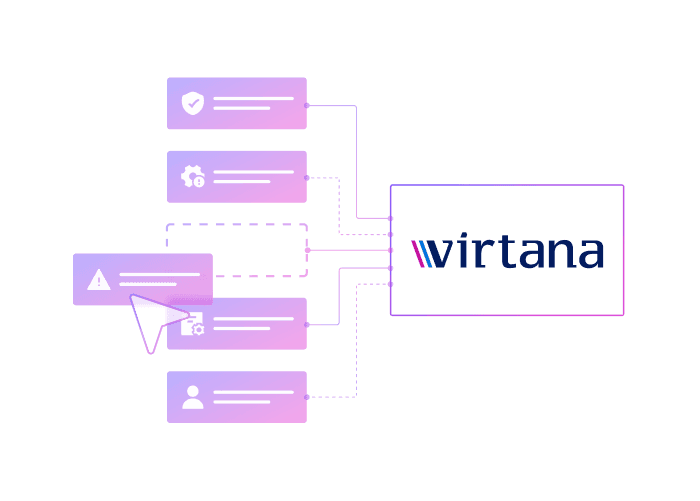Salesforce talent as a service is transforming the way businesses manage their CRM platforms. Building an in-house Salesforce team comes with steep costs. But the talent gap shouldn’t stop you from maximising your Salesforce capabilities. Businesses can now access certified experts through Salesforce services at predictable costs.
Studies indicate that most global organisations struggle with one main challenge – they lack the right internal skills to implement Salesforce effectively.
Salesforce MSPs provide complete services that help businesses run their Salesforce environment smoothly. These providers bring teams of certified professionals to support your organisation’s specific needs. The team includes administrators, consultants, and developers. On top of that, these managed services are flexible enough to either run your entire Salesforce operations or work alongside your existing team. This setup offers the ideal balance of cost and results for most businesses.
How Salesforce Managed Services Integrate TaaS
The Talent-as-a-Service (TaaS) model has become a key approach for businesses that want specialised expertise without going through traditional hiring. This workforce model works well in the complex Salesforce ecosystem, where technical expertise comes at a premium.
What is Talent-as-a-Service (TaaS)?
TaaS is a workforce approach that lets organisations hire skilled, on-demand professionals quickly and cost-effectively. Unlike regular recruitment, TaaS connects businesses with specialised talent through service providers. These providers have networks of experts ready to jump in based on project needs.
The model benefits everyone involved. Professionals get experience from various projects, and organisations can access specialised skills without long-term commitments. TaaS works like other “as-a-service” offerings and provides flexible scaling options that fit dynamic business needs perfectly.
TaaS offers these key benefits:
- Better recruitment flexibility that responds to changing business conditions
- Access to high-demand and specialised skill sets
- Cost-effective pricing compared to full-time hiring
- Quick hiring for critical positions
- You can scale teams up or down based on project needs.
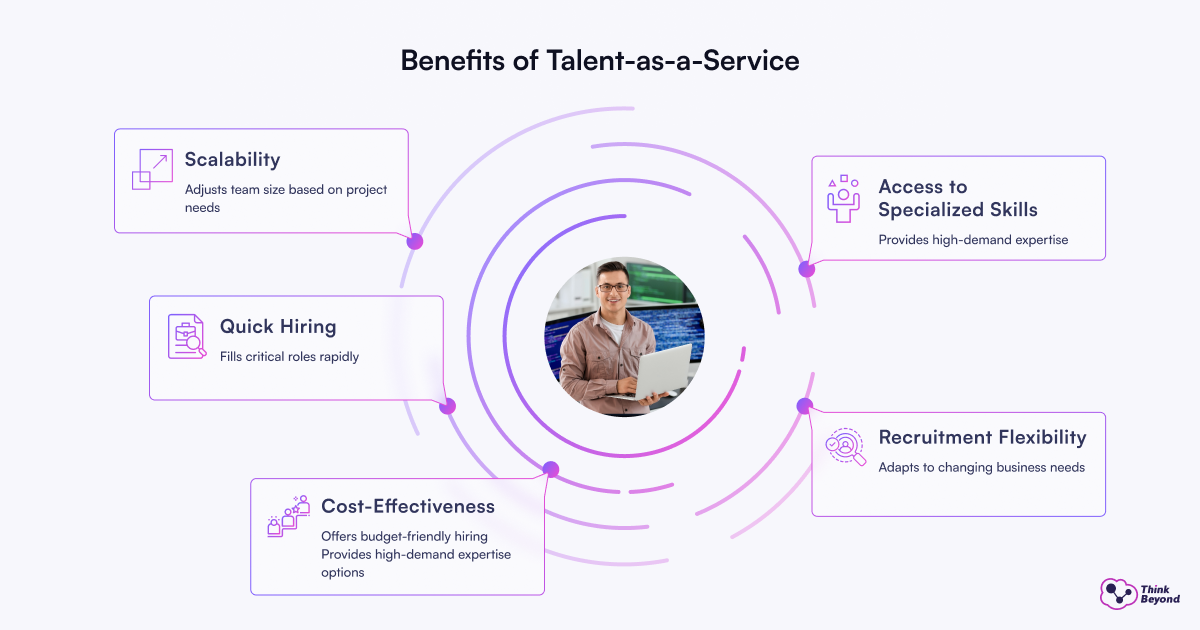
Why TaaS is critical for Salesforce ecosystem
Implementing and maintaining Salesforce takes specialised knowledge that many organisations don’t have internally. TaaS has become vital for Salesforce environments for several reasons:
- Salesforce implementations require deep, specialised knowledge for effective testing and quality assurance. This expertise ensures configurations, customisations, and integrations work flawlessly, protecting business operations from costly errors. TaaS provides access to highly skilled Salesforce testers and QA professionals who bring proven methodologies and platform-specific know-how, which internal teams often lack or can’t maintain continuously.
- Expertise in Salesforce platform is increasingly geographically dispersed, driven by globalisation and remote work trends. With TaaS, organisations can tap into a global talent pool regardless of location, overcoming local talent shortages and time-zone challenges. This distributed model helps maintain continuous project momentum and support, vital in Salesforce environments that operate 24/7.
- Salesforce releases frequent updates with new features, tools, and best practices. Technical skills must evolve constantly to leverage innovations and ensure system stability. TaaS providers invest in ongoing training and certification for their talent, ensuring customers always get access to experts current with the latest Salesforce capabilities and compliance requirements.
- Organisations face pressure to optimise their Salesforce investments by balancing premium expertise with budget controls. TaaS offers a cost-efficient model, eliminating fixed staffing overhead in favour of flexible, on-demand resources. This approach allows businesses to scale talent based on project phases or emerging needs while strictly managing costs, supporting faster ROI and ongoing platform success.
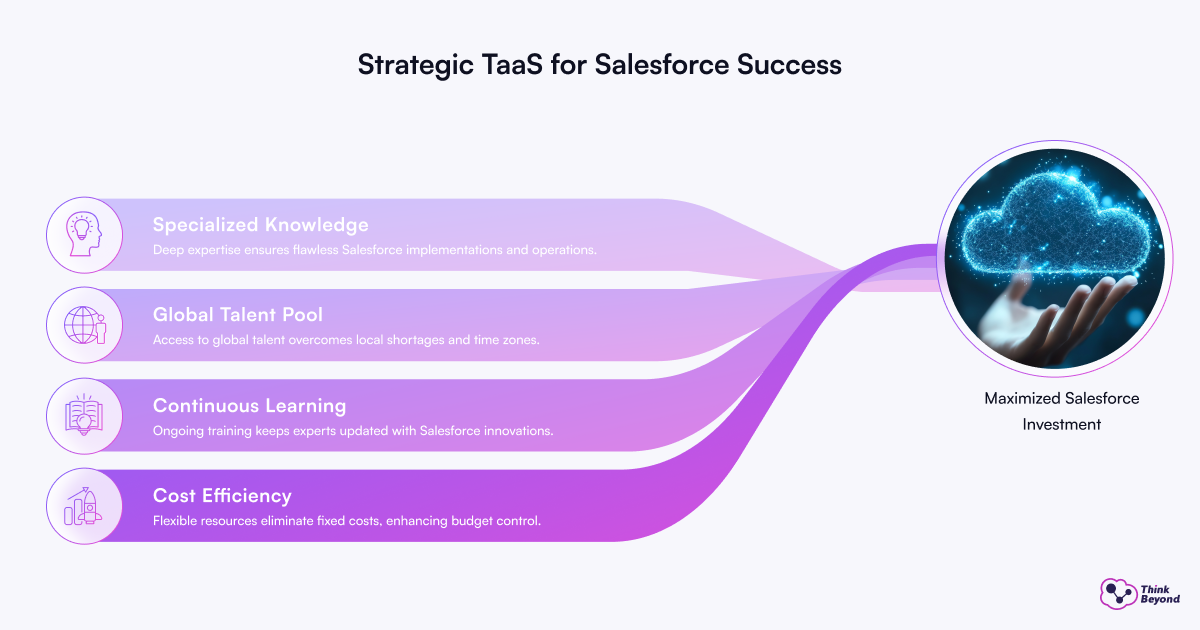
On-Demand Access to the Full Salesforce Talent Spectrum
Salesforce MSP gives you quick access to a complete range of specialised professionals. Your organisation can handle complex Salesforce challenges without keeping a large in-house team, thanks to this diverse talent pool.
Salesforce Developer: LWC and Apex development
Salesforce developers step in when tailored functionality is needed beyond configuration. With deep expertise in Apex, they design and implement business logic to perform operations like database updates, integration callouts and automation. They leverage Salesforce’s capabilities to handle complex rules and calculations that drive the application’s success.
On the front end, developers utilise Lightning Web Components framework with Salesforce Lightning Design System to create rich user experiences. These frameworks enable modern, interactive user interfaces that allow end-users to interact with back-end data and processes in real-time easily.
Salesforce Architect: System design and scalability planning
Technical Architects stand at the top of the Salesforce talent spectrum. They design secure, high-performance solutions within larger IT environments. These Salesforce experts focus on system structure, integration points, and security frameworks while planning for growth. Technical Architects manage entire design projects. They ensure implementations stay functional, secure, cost-effective, and match specific business needs.
Salesforce Consultant: Business process alignment
Salesforce Consultants connect business needs with technical solutions. These experts understand business models and processes before the coding phase begins. They look at what the customers want, plan workshops where different groups of people can participate, and look for solutions that help them give accurate answers to those needs. Their work ensures Salesforce implementations fit perfectly with operational workflows. Consultants turn business needs into practical solutions while focusing on user experience. They conduct stakeholder interviews, map processes, and design solutions that address real-life challenges.
MuleSoft Developer: Integration expertise
MuleSoft Developers connect Salesforce with other enterprise systems. They design and build integration solutions with MuleSoft’s Anypoint Platform. These experts help companies unify business processes and enable consistent data movement between cloud and on-premises environments. Companies value MuleSoft specialists because they ensure continuous, reliable operations for business continuity.
Salesforce Administrator: System configuration & maintenance
Salesforce Administrators are the foundation of the health of any system. They customise settings such as user access, data fields, workflows, and automation, keeping the platform running smoothly and aligned with business processes. These professionals manage users and customise Salesforce objects. They set up security protocols and ensure data quality, and implement improvements to get the most value from the platform.
Salesforce Testers: Quality Assurance
Salesforce testers verify that workflows, automations, and customisations align with an organisation’s operational needs. They validate that Salesforce functions as intended in real-world scenarios, helping to guarantee harmonious, efficient, and error-free business operations.
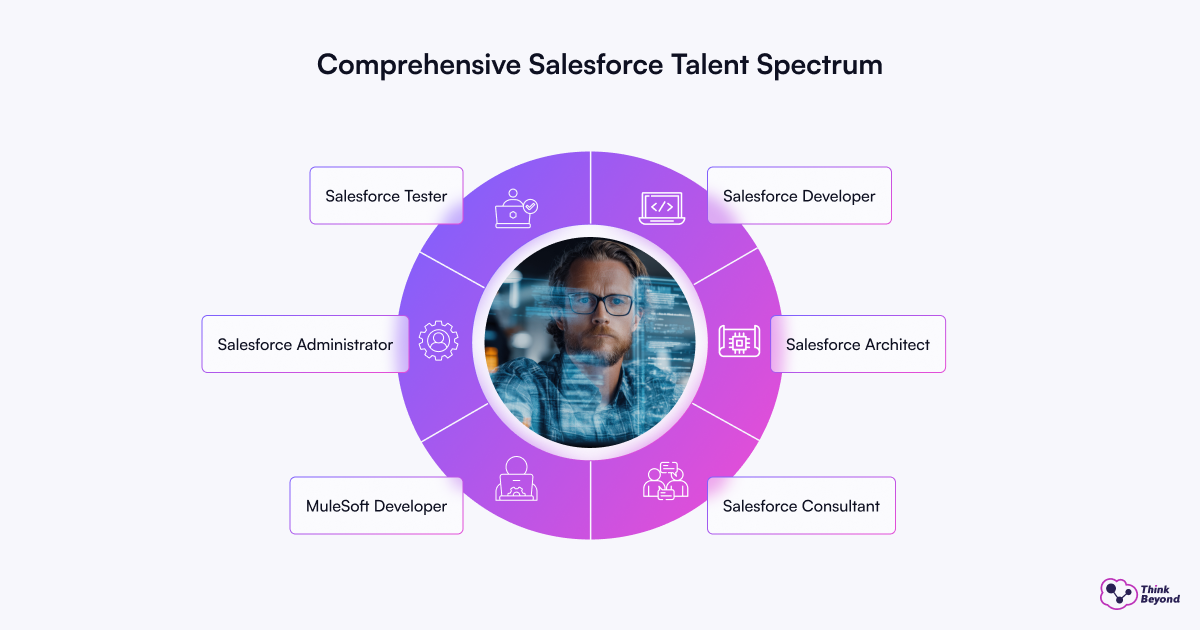
Scalable and Flexible Support Models
Modern Salesforce managed service providers give their clients different financial and operational models that work with business requirements of all sizes. These flexible frameworks help organisations get the most from their investment while keeping their budget in check.
Pay-as-you-go vs. fixed retainer models
Budget predictability plays a vital role when choosing Salesforce MSP engagement models. Organisations typically pick between two main approaches:
- subscription-based pay-as-you-go models
- or fixed monthly retainers.
Pay-as-you-go services come with lower monthly base costs and hourly charges for extra support, which saves money initially. Fixed retainer arrangements bundle detailed support into one monthly fee, which creates stable budgets, whatever the service volume.
Both models bring their own benefits. Pay-as-you-go structures work best for organisations that just need occasional Salesforce support or want to try managed services first. Fixed retainer models transfer technical risk to the MSP and give peace of mind through unlimited access without billing surprises. Yes, it is common for businesses to find this predictability better for their budget, especially when support needs change with the seasons.
Scaling up or down based on project needs
MSPs create scalable solutions that adapt smoothly to changes in demand and evolving business needs. Quality providers can combine new Salesforce offerings faster, like Sales Cloud, Service Cloud, or Marketing Cloud, without hiring lots of internal staff.
The flexibility goes beyond adding new platforms. Companies can add more resources during implementation projects or busy seasons, then scale back in quieter times. This adaptability covers team size and specialised skills, which lets businesses access expert help like Marketing Cloud specialists without long-term hiring commitments.
24/7 support and global delivery capabilities
Leading Salesforce Partners now provide round-the-clock support as standard. Service packages include constant system monitoring, performance optimisation, and quick problem-solving. This ongoing support prevents downtime and resolves issues quickly.
Many providers guarantee response times for critical issues, some respond within an hour for business-stopping problems. Their global delivery approach makes support available across time zones, with 24/7/365 technical help through multiple channels like chat, phone, and case submission systems.
TaaS as a Strategic Approach to Maximising Salesforce Investment
The TaaS model shines during implementation projects, system migrations, and specialised initiatives that need specific expertise. Companies overcome traditional talent constraints by getting on-demand access to professionals with deep knowledge of specific Salesforce products. This becomes even more valuable as Salesforce keeps evolving its platform offerings.
The Salesforce talent-as-a-service model ended up becoming a strategic way to maximise platform investment. MSPs provide detailed expertise, operational flexibility, and cost efficiency. These are the foundations of successful Salesforce implementations. While traditional hiring still works in some cases, the MSP approach offers a compelling alternative that matches technical capabilities with business goals while keeping focus on core organisational priorities.
Case Study
Virtana: Salesforce Managed Services
Managing day-to-day Salesforce operations
